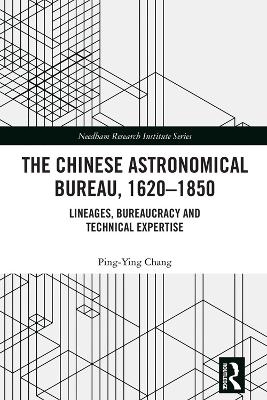
The Chinese Astronomical Bureau, 1620–1850
Lineages, Bureaucracy and Technical Expertise
Seiten
2024
Routledge (Verlag)
978-1-032-35490-3 (ISBN)
Routledge (Verlag)
978-1-032-35490-3 (ISBN)
This book offers a new insight into one of the most interesting and long-lived institutions known to historians of science, the Chinese imperial Astronomical Bureau, which for two millennia observed, recorded, interpreted and predicted the movements of the celestial bodies.
Utilising archival material, such as the résumés written for imperial audiences and personnel administration records, the book traces the rise and fall of more than thirty hereditary families serving at the Astronomical Bureau from the late Ming period to the end of the Qing dynasty. The book also presents an in-depth view into the organisation and function of the Bureau and succinctly charts the impacts of historical developments during the Ming and Qing periods, including the Regency of Prince Dorgon, the influence of the Jesuits, the relationship between the Kangxi and Yongzheng emperors and the He family and the failure of the bureau to predict correctly the solar eclipse of 1730.
Presenting a social history of the Qing Astronomical Bureau from the perspective of hereditary astronomer families, this book will be of interest to scholars and students of Chinese Imperial history, the history of science and Asian history.
Utilising archival material, such as the résumés written for imperial audiences and personnel administration records, the book traces the rise and fall of more than thirty hereditary families serving at the Astronomical Bureau from the late Ming period to the end of the Qing dynasty. The book also presents an in-depth view into the organisation and function of the Bureau and succinctly charts the impacts of historical developments during the Ming and Qing periods, including the Regency of Prince Dorgon, the influence of the Jesuits, the relationship between the Kangxi and Yongzheng emperors and the He family and the failure of the bureau to predict correctly the solar eclipse of 1730.
Presenting a social history of the Qing Astronomical Bureau from the perspective of hereditary astronomer families, this book will be of interest to scholars and students of Chinese Imperial history, the history of science and Asian history.
Ping-Ying Chang is Adjunct Assistant Professor of mathematics at the National Taiwan Normal University, Taiwan, where she teaches courses on the history of mathematics and mathematical thinking in fictions and films.
1. Introduction 2. The Organization of the Qing Astronomical Bureau 3. From the Old Method to the New Method 4. Kangxi Calendar Dispute 5. Emperors and the He Brothers 6. The Solar Eclipse of 1730 7. Knowledge Reproduction 8. Maintaining a Familial Career 9. The Decline of Missionary Influence and the Nineteenth-Century Reforms of the Astronomical Bureau 10. Conclusion
| Erscheinungsdatum | 10.01.2023 |
|---|---|
| Reihe/Serie | Needham Research Institute Series |
| Zusatzinfo | 25 Tables, black and white; 8 Line drawings, black and white; 9 Halftones, black and white; 17 Illustrations, black and white |
| Verlagsort | London |
| Sprache | englisch |
| Maße | 156 x 234 mm |
| Gewicht | 453 g |
| Themenwelt | Geschichte ► Allgemeine Geschichte ► Neuzeit (bis 1918) |
| Geisteswissenschaften ► Geschichte ► Regional- / Ländergeschichte | |
| Sozialwissenschaften ► Soziologie ► Spezielle Soziologien | |
| ISBN-10 | 1-032-35490-9 / 1032354909 |
| ISBN-13 | 978-1-032-35490-3 / 9781032354903 |
| Zustand | Neuware |
| Haben Sie eine Frage zum Produkt? |
Mehr entdecken
aus dem Bereich
aus dem Bereich
Europa 1848/49 und der Kampf für eine neue Welt
Buch | Hardcover (2023)
DVA (Verlag)
CHF 67,20
Giordano Bruno - ein ketzerisches Leben
Buch | Hardcover (2024)
C.H.Beck (Verlag)
CHF 41,85


